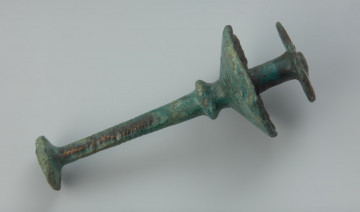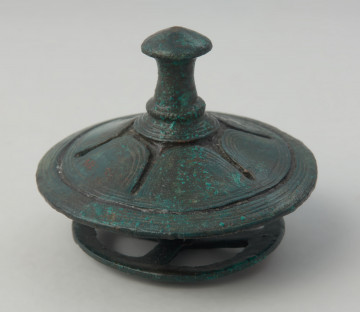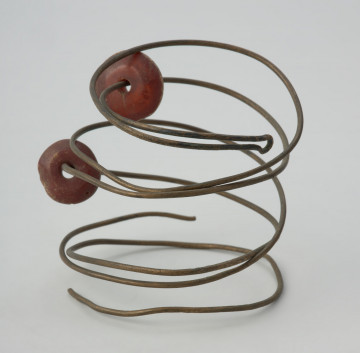
Tutullus
around 1100 p.n.e. — 900 p.n.e.
National Museum in Szczecin
Part of the collection: Bronze Age
The bronze pin, found in the town of Budno most probably belonged to grave goods, from the burial discovered closed to the so-called Schwedenschanze place, meaning “Swedish redoubt”. The pin could be dated to the Late Bronze Age. So far, no analogous examples were found, but it can be most probably linked to the material culture of the Lusatian culture, and more precisely, with its locally community of Western Pomerania which occupied that area since the Middle Bronze Age. Besides numerous ceramics finds from this culture, equally large number of bronze objects are found, mainly tools, ornaments and weapons, characterized by a variety of forms and designs, which indicates that bronze workshops and centres existed in these locations. They also produced items that were stylistically similar to those from the areas occupied by the culture of the Nordic Bronze Age (northern Germany, Denmark and southern Scandinavia) and the areas of the Danube and Alps.
Monika Witek
Author / creator
Dimensions
the entire object: height: 18 cm
Object type
costium adorment
Technique
casting
Material
bronze
Origin / acquisition method
legal transfer
Creation time / dating
Creation / finding place
Owner
National Museum in Szczecin
Identification number
Location / status

around 1100 p.n.e. — 900 p.n.e.
National Museum in Szczecin

around 1100 p.n.e. — 900 p.n.e.
National Museum in Szczecin

around 900 p.n.e. — 750 p.n.e.
National Museum in Szczecin
DISCOVER this TOPIC
Museum of King Jan III's Palace at Wilanów
DISCOVER this PATH
Educational path